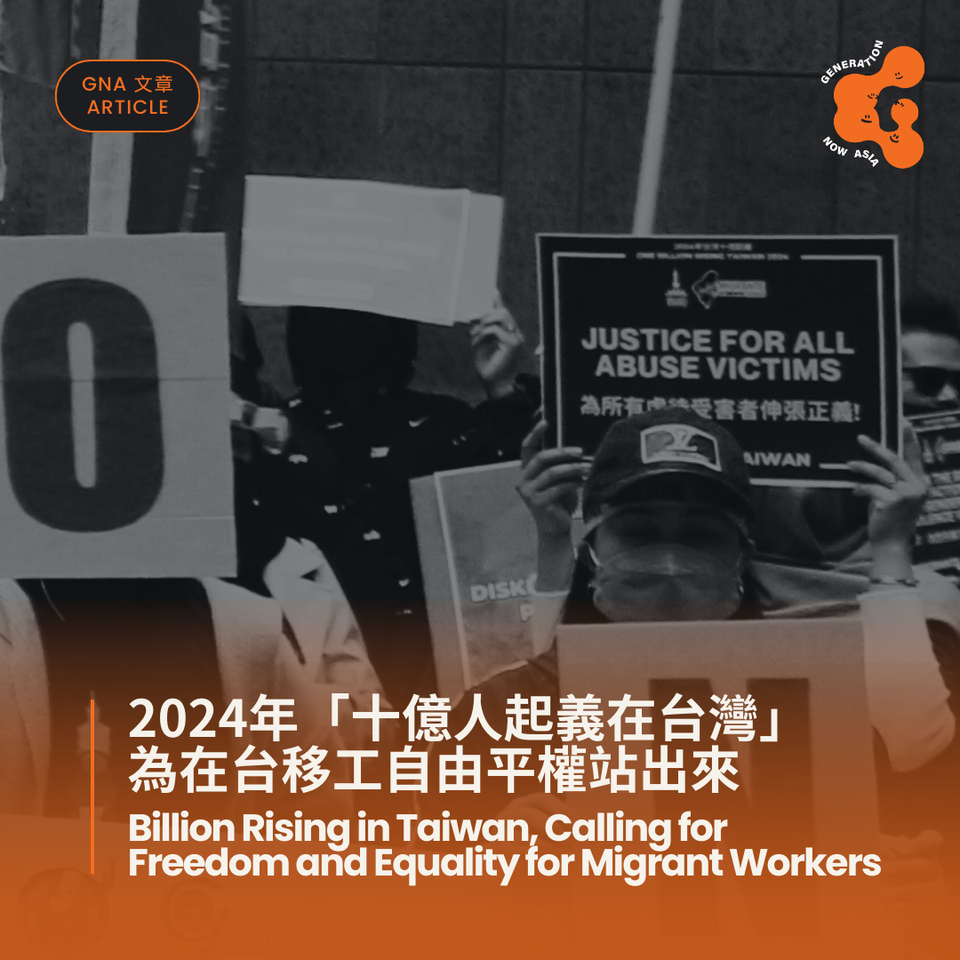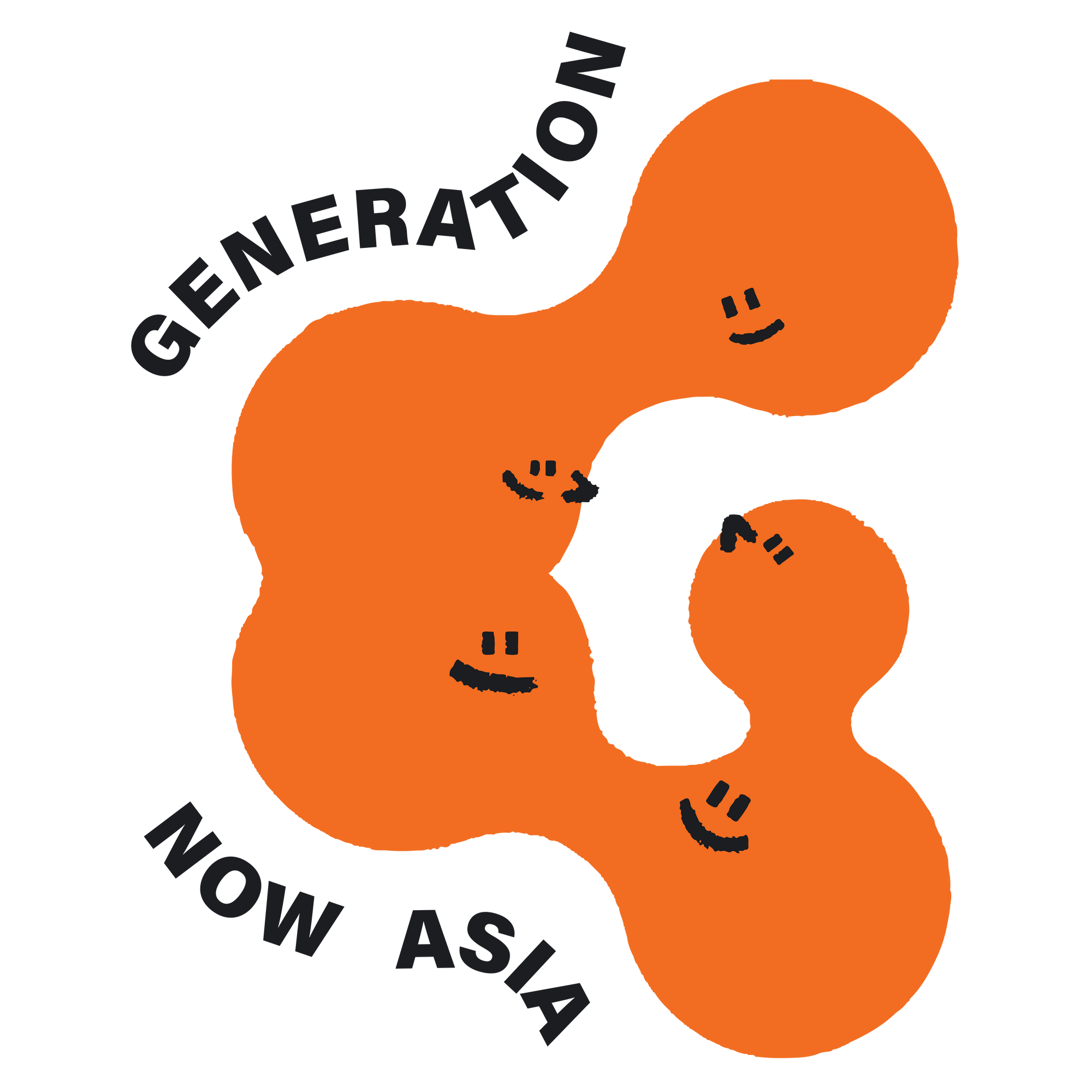【2024年「十億人起義在台灣」 為在台移工自由平權站出來】 Billion Rising in Taiwan, Calling for Freedom and Equality for Migrant Workers

文:黃梅舒
假日是勞工喘息的時刻,但3月10日週日下午,有群人卻犧牲自己的休息時間,沿著台北車站外圍繞行。在他們之中,有些人可能甚至一個月只享有一次休假。這群人是在台灣的外籍移工。他們高聲呼喊:「我們不是奴隸!我們是勞工!(We are not slaves! We are workers!)」,要為自己爭取勞工權益。
這場遊行響應「十億人起義(One Billion Rising)」運動。該運動由社會運動家恩斯勒(Eve Ensler)發起,旨在消除全球女性所面臨的性侵害與性暴力。根據世界衛生組織(WHO)的數據,全球約有1/3的女性一生中曾遭受毆打或性暴力,占超過十億人口。
今(2024)年的「十億人起義」以「為自由站出來」(Rise for Freedom)為題,透過遊行、舞蹈與行動劇,要求政府正視並拿出實際作為,改善女性移工在職場中面臨的性暴力,也呼籲該議題應受到更多人關注。
家務移工 現代奴隸中最易受到剝削的一群
45歲、來自菲律賓的Francia,在菲律賓育有兩子,來台工作11年。她站在台北車站大廳中央,拿著麥克風,講述自己的故事。
2015年,時任家庭看護的Francia被雇主毆打全身是傷。她向仲介申訴,得到的回覆卻是:「如果你需要錢,就繼續待著。」當時Francia為了籌措女兒的醫藥費,加上初到台灣、不清楚勞工權益。沒辦法,只得忍著。所幸朋友發現異狀,才把她救出來。這樣的際遇讓她後來與夥伴成立「全國家戶勞動產業工會」(National Domestic Workers’ Union),倡議改善家務勞工的工作環境。
Francia表示:「如果你在工廠工作,你被虐待的時間可能是8小時、12小時。但家務移工呢?是24小時。因為他們就住在雇主家中,有些人甚至沒有自己的床,他們跟病人睡在一起。」
「反奴隸國際組織」(Anti-Slavery International)在其官網上列出七種常見的現代奴隸類別。其中家務勞工因為居住在雇主家中,欠缺機構與機關監管,導致這類型的勞工尤其脆弱且容易遭受虐待、剝削及奴役。
女性移工面臨的性暴力風險為台灣女性的三倍
根據桃園市群眾服務協會的一項調查,發現16%的在台女性移工曾受過性暴力,風險約為台灣女性的3倍,而90%以上的性暴力事件發生在家庭類移工身上。最常遇到的暴力樣態前四名分別為:不必要的身體接觸(32.53%)、多項性騷擾並行(31.33%)、口頭騷擾(14.46%)以及缺乏尊重私人空間(13.25%)。
桃園市群眾服務協會分析指出,雇主會利用勞資關係的不對等,以交換利益的方式對家務移工進行騷擾與侵害。由於台灣長照缺乏對專業工作的尊重及公私領域的劃分,被照護者就是主要加害者。而且性暴力很少止於單一事件,有超過60%的移工經歷多次性別暴力,其中更有50%表示性暴力頻率高達每日發生。
部分女性移工在面對性暴力時會當場拒絕或事後通報,但仍有近20%的女性移工在當下或事後無法採取任何行動,原因在於蒐證困難、受害者害怕報復以及失去工作,加上不清楚法律以及求助管道,而阻礙爭取自身權益。
申訴管道缺乏政策宣導 接線員未必曾受專業訓練
桃園市群眾服務協會移工政策處主任汪英達表示,雖然勞動部於2009年設置「1955外籍移工24小時諮詢保護專線」,提供中、英、泰、印尼、越南五種語言的諮詢、翻譯與申訴服務,但許多移工與民眾並不知道有這項服務。除了申訴管道欠缺宣導,接線人員是否具備專業訓練也是問題。
汪英達表示,許多移工會用問問題的方式來申訴,例如:「雇主沒有讓我放假,這樣可以嗎?」若遇上缺乏訓練、敏感度不足的接線人員,可能會以一問一答的方式回覆:「可以看合約啊」,而不是點出問題或往下追問。
「我們常常聽到移工傳來(與接線人員溝通)的訊息,與他們(接線人員)跟我們講的完全不一樣。他們(接線人員)對台灣人會比較小心。」汪英達表示,不同的接線人員,同個問題可能會有不同的回答與不同的引導方式,申訴效果難以預期。「1955專線只能做60分,你不能預期它的服務是很好的。」
家務移工照顧長者的健康,而他們的權益又由誰保障?
一般可依勞工的專業與享有的薪資與權益,大致分為「白領」與「藍領」。移工也不例外。參考《就業服務法》第46條,在台就業的外國人大致又可分為「白領移工」與「藍領移工」。前者是指第46條第1項第1~6款,包含高階管理層、學校或補習班教師、運動教練與運動員、藝術工作者等。後者則為同條同項第8~11款,像是漁工、家庭幫傭、廠工及家庭看護等。
在台灣,家務勞工不受《勞動基準法》保障,低薪超時是常態,工作也時常餓著肚子。「我並不是說雇主家沒有食物,但你能想像我們被允許吃雇主的食物嗎?當然是不行」Francia表示,在她待的庇護所,許多家務移工的健康狀況不佳,不少人甚至罹患癌症。
汪英達補充,多數的家務勞工除了照顧長者之外,還會被要求做其他的工作,例如打掃家裡、煮飯、洗衣服,甚至變成一整個家族共用的幫傭,基本上就是一個人做超過兩人份以上的工作。
當不被《勞動基準法》保障的看護移工回國後,同樣不受到母國的法律保障。以菲律賓為例,直到去(2023)年,才由國內的Kabayan「政黨名單」(Party-list)眾議員Ron P. Salo提出第8574法案(House Bill No.8574),又可稱作「Kabayan菲律賓海外勞工退休法案」(Kabayan OFW Pension Act),旨在建立專門給菲律賓海外勞工的退休金制度,此法案還在推進中。
全國家戶勞動產業工會負責人Banugan表示,「我們試著說服菲律賓政府與我們站在一塊,但他們毫無作為,也沒有提供任何的資源與協助。」
遇到這樣的雇主,想換工作卻沒那麼容易。根據《就業服務法》第53、59條規定,除非雇主或看護者死亡或移民;船舶被扣押、沉沒或修繕而無法繼續作業;雇主關廠、歇業等狀況,否則藍領移工(包含看護移工、漁工以及廠工)不得轉換雇主或工作。
Banugan表示,當移工失去工作且受限於法規、無法尋找下一份工作時,不肖仲介就會藉機「賣工作」給移工。根據《就業服務法》第40條第1項第5款與第45條,收取「買工費」或「轉換費」是違法的。若有違法事宜,可處以10~20倍罰鍰、1年以下停業和設立許可證到期不予換證之處分。
2016年,立法院三讀通過《就業服務法》第52條修正案,刪除外籍移工三年聘僱期滿應出境至少一天的規定,減輕移工經濟負擔及雇主訓練成本與空窗期。雖然修法表面上看似保障了移工,但利害關係人還是會有因應之道。汪英達解釋,這是因為修法後仲介收費的次數變少了,導致不肖仲介變向提高「仲介費」。
「我希望台灣、菲律賓以及印尼的政府能夠互相合作,讓海外的移工們能夠受到保障」Francis說道。「即使我離開台灣了,我還是希望有天移工能過上更好的生活、職場環境能夠改善、也能夠被法律保障。」
參考資料:
- One Forty,移工與外籍勞工的差異?從零接觸移工議題的你,一定要看!
- 本文部分資料擷取自桃園市群眾服務協會〈探索女性移工心聲:性別暴力問卷調查〉簡報
- Anti-slavery International, “What Is Modern Slavery?”
- 全國法規資料庫,《就業服務法》
- 立法院,〈外籍勞工遭「買工費」剝削之問題研析〉
Billion Rising in Taiwan, Calling for Freedom and Equality for Migrant Workers
By: Claire Huang
Weekends are a time for workers to catch their breath, but on a Sunday afternoon, on March 10th, a group of people sacrificed their rest time, marching around Taipei Main Station, calling for their labour rights and shouting "We are workers! We are not slaves!". Among them are Southeast Asian migrant workers, who some may only enjoy a day off once a month.
For 2024, "One Billion Rising" global movement adopted the theme of "Rise for Freedom." In Taiwan, the movement incorporated advocating for the rights of migrant workers, with participants expressing their demands through dance, street theater, and marches, calling for the government to address and improve the issue of sexual violence faced by female migrant workers in the workplace.
One Billion Rising is a global campaign, founded by Eve Ensler, and aimed at eliminating sexual assault and violence against women worldwide. According to the World Health Organization (WHO), approximately one-third of women globally experience physical or sexual violence in their lifetime, accounting for over one billion people.
Migrant domestic workers: Among the Most Exploited Modern Slaves
Francia, 45, from the Philippines, is a mother of two and has been working in Taiwan for 11 years. She stood in the central hall of Taipei Main Station, holding a microphone, sharing her story.
In 2015, while working as a domestic caregiver, Francia was physically abused by her employer, leaving her body covered in bruises. When she complained to the agency, the response she received was: "If you need money, just stay [working with your employer]." At the time, Francia needed money for her daughter's medical expenses, she was new to Taiwan and unaware of her labour rights. She had no choice but to endure. Fortunately, a friend noticed something was wrong and rescued her. This experience led her and her colleagues to establish the National Domestic Workers’ Union (全國家戶勞動產業工會), advocating for improvements for domestic caregivers in Taiwan.
Francia shared, "If you work in a factory, you might be abused for 8 or 12 hours. But what about domestic migrant workers? It's 24 hours. Because we live in our employer's house, some domestic workers don't even have their own beds; they sleep with the patients."
The International Anti-Slavery Organization lists seven common categories of modern slavery on its website. Domestic caregivers, due to living in their employer's homes and lacking institutional and regulatory oversight, are particularly vulnerable and prone to abuse, exploitation, and enslavement.
The Risk of Sexual Violence Faced by Female Migrant Workers is Three Times Higher than for Taiwanese Women
According to a survey by Serve the People Association (桃園市群眾服務協會), 16% of female migrant workers in Taiwan have experienced sexual violence, which is three times higher than for Taiwanese women. Moreover, over 90% of sexual violence incidents occur among domestic workers. The most common forms of violence include unnecessary physical contact (32.53%), multiple forms of harassment (31.33%), verbal harassment (14.46%), and lack of respect for personal space (13.25%).
Serve the People Association's analysis suggests that employers use the unequal power dynamic to harass and harm domestic migrant workers for their own benefit. Due to a lack of respect for professional work and blurred boundaries between public and private domains in Taiwan's long-term care system, the cared-for individuals become the main perpetrators of abuse. Furthermore, sexual violence rarely occurs as a single incident; over 60% of migrant workers experience multiple instances of gender-based violence, with 50% reporting high frequencies of sexual violence occurring daily.
Some female migrant workers may refuse or report sexual violence on the spot, but nearly 20% are unable to take any action at the time or afterward due to difficulties in gathering evidence, fear of retaliation, loss of employment, lack of knowledge about laws and channels for seeking help, hindering their efforts to assert their rights.
The Lack of Policy Promotion for Complaint Channels and Untrained Hotline Operators
Lennon Ying-dah Wong (汪英達), director of migrant worker policies at the Serve the People Association, says that although the Ministry of Labor established the "1955 Counselling and Protection Hotline for Foreign Workers" in 2009, providing consultation, translation, and complaint services in Chinese, English, Thai, Indonesian, and Vietnamese, many workers and the general public are unaware of this service. In addition to a lack of promotion for complaint channels, the problem also lies in whether hotline operators are adequately trained.
Lennon explained that many migrant workers express complaints through questioning, such as: "Is it okay for the employer not to give me a day off?" If hotline operators lack training and sensitivity, they may respond with simple answers like, "You can check your contract," instead of identifying the problem or probing further.
"We often hear messages from migrant workers [communicating with hotline operators] that are completely different from what they [the operators] tell us. They [the operators] are more cautious when dealing with Taiwanese people," says Wang Yingda, indicating that different operators may provide different responses and guidance to the same issue, making it difficult to predict the effectiveness of complaints. "The 1955 hotline can only do so much in 60 minutes; you can't expect its service to be excellent."
Domestic Caregivers Take Care of the Elderly, but Who Protects Their Rights?
Generally, based on a worker's profession, salary, and entitlements, workers are broadly categorised as "white-collar" or "blue-collar." Migrant workers are no exception. Referring to Article 46 of the Employment Service Act, foreigners employed in Taiwan can generally be classified as "white-collar migrant workers" or "blue-collar migrant workers." The former refers to those listed in Article 46, paragraphs 1 to 6, including high-level management, school or cram school teachers, sports coaches and athletes, and artists. The latter refers to those listed in the same article, paragraphs 8 to 11, such as fishermen, domestic helpers, factory workers, and domestic caregivers.
Domestic caregivers in Taiwan are not protected by the Labor Standards Act, with low wages and overtime being the norm, and they often go hungry while working. "I'm not saying that there's no food in the employer's house, but can you imagine being allowed to eat your employer's food? Of course not," says Francia. In the shelter where she stays, many domestic caregivers' health conditions are poor, and some even suffer from cancer.
Lennon adds that in addition to caring for the elderly, most domestic caregivers are required to perform other tasks, such as cleaning the house, cooking, doing laundry, and even becoming a shared domestic helper for the entire family, essentially doing the work of more than two people.
When caregivers who are not protected by the Labor Standards Act return to their home countries, they aren’t protected by any law in their home country either. Take the Philippines as example, it is not until 2023 that the Kabayan Party-list representative Ron P. Salo has proposed the House Bill No. 8574, also known as the Kabayan OFW Pension Act, the first-ever legislation which aims to create the pension system for oversea workers. The bill is still in progress.
Banugan, head of the National Domestic Workers’ Union, shared "We try to persuade the Philippine government to stand with us, but they do nothing and provide no resources or assistance."
Wanting to change jobs as a migrant worker is not so easy. According to Articles 53 and 59 of the Employment Service Act, blue-collar migrant workers including domestic workers, fisherman, factory workers cannot change employers or jobs unless the employer or caregiver dies or emigrates; the vessel is detained, sunk, or undergoing repairs and cannot continue operations; or the employer closes or suspends operations.
Banugan stated that when migrant workers lose their jobs and are restricted by regulations and unable to find the next job, exploitative brokers seize the opportunity to "sell jobs" to them. According to Article 40(5) and Article 45 of the Employment Service Act, charging "job purchase fees" or "conversion fees" is illegal. If there are violations, perpetrators could receive fines of 10 to 20 times the amount, and penalties such as suspension of business for up to one year and refusal to renew licence can be imposed.
In 2016, the Legislative Yuan passed the third reading of the amendment to Article 52 of the Employment Service Act, deleting the requirement for foreign workers to leave the country for at least one day after the completion of their three-year employment period, reducing the economic burden on migrant workers, in addition to the training costs and downtime for employers. Although the amendment seems to protect migrant workers on the surface, stakeholders still find ways to adapt. Lennon explained that because the number of times brokers can charge migrant workers fees has decreased after the amendment, brokers instead have increased their agency fees and found other ways to exploit these Southeast Asian workers.
"I hope that the governments of Taiwan, the Philippines, and Indonesia can cooperate with each other to ensure the protection of overseas migrant workers," Francis said. "Even though I am leaving Taiwan, I still hope that one day migrant workers can live better lives, workplace environments can improve, and they can be protected by the law."
References:
- One Forty: Southeast Asian Migrant Workers in Taiwan
- Serve the People Association (桃園市群眾服務協會) "Exploring the Voices of Female Migrant Workers: Gender Violence Questionnaire Survey"
- Anti-slavery International, “What Is Modern Slavery?”
- Law and Regulations Database "Employment Service Act"
- Legislative Yuan, 外籍勞工遭「買工費」剝削之問題研析〉
- TIWA: 30 years of the implementation of《Employment Service Act 》A joint declaration of migrant workers’ organizations 20220508



